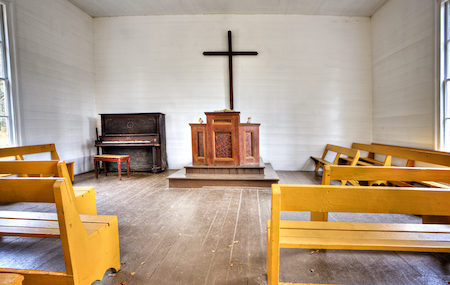Music holds a special place in the heart of any worship service. It brings the congregation a sense of spirituality, joy, and unity. Yet selecting the right piano when you have so many choices is difficult. Will an acoustic piano be better? Or will a digital piano provide more opportunities? Each type has its own unique features and benefits.
The question remains, which one should your church invest in?
How an acoustic piano can benefit church
There’s something timeless and magical about the sound of an acoustic piano resonating through a church sanctuary. It produces a unique sound that cannot be replicated by any other instrument. This traditional instrument has been the cornerstone of church music for centuries, and for a good reason.
An acoustic piano provides an authentic playing experience. The touch and feel of the keys, the responsiveness to the pianist’s dynamics, and the natural sustain all contribute to a deeply expressive performance. This can be particularly important for churches emphasizing classical or traditional music styles, where the instrument’s nuances are highly valued.
Acoustic pianos require no external amplification. They have the power to fill a large space with their natural sound projection. This can be advantageous for churches with acoustically vibrant sanctuaries, as the piano’s resonance can enhance the overall sonic experience and create a captivating atmosphere.
Acoustic pianos are also known for their durability and longevity. They can last a lifetime if properly maintained. They maintain their value over time and can be considered a long-term investment for your church. It’s also worth noting that an acoustic piano does not require electricity or amplification systems, making them a sound choice for small church sanctuaries.
How a digital piano can benefit church
In recent years, digital pianos have gained popularity in various musical settings, including churches. These versatile instruments offer a range of benefits that cater to the evolving needs of modern worship services.
One of the most significant advantages of digital pianos is their versatility. They often come equipped with a wide selection of built-in sounds, including high-quality piano samples that closely mimic the sound of an acoustic piano. This allows musicians to explore different tones and textures, adapting to various musical genres and styles. Additionally, digital pianos can replicate other instruments like organs, strings, and choirs, expanding the range of musical possibilities during worship services.
Digital pianos also provide the advantage of portability. They are generally lightweight and easy to move, making them ideal for churches with limited space or needing to relocate the instrument for different events. Additionally, digital pianos can be connected to sound systems or headphones, allowing for precise volume control and accommodating different acoustic environments.
Digital pianos have several features, such as MIDI compatibility, record and playback functions, and headphone jacks. With these features, musicians can record rehearsal sessions, making it easier for them to critique and improve their performance. It can be a valuable tool for church musicians involved in composition or production.
Which piano is the right solution for your church?
Choosing between an acoustic and digital piano can be challenging, but the decision can ultimately be based on the worship your church provides. If your church leans more towards traditional hymns and old gospel tunes, an acoustic piano will suit your needs better. However, if your church enjoys predominantly contemporary gospel music, a digital piano offers versatility and features. Things to consider include:
- Space and Portability – Evaluate the available space in your church’s sanctuary and the need for portability. If you have limited space or frequently host events in different locations, a digital piano’s portability and ease of transportation may be a key factor in your decision. On the other hand, if you have a dedicated space and prefer a more permanent fixture, an acoustic piano can add a touch of elegance and tradition to your sanctuary.
- Budget – Financial considerations are crucial when choosing a piano for your church. Acoustic pianos tend to be more expensive upfront, and their maintenance and tuning costs should also be factored in. Digital pianos offer a more affordable initial investment, and generally require less maintenance over time.
- Technological Integration – Assess your church’s needs for technology integration. A digital piano provides the necessary features if you connect your piano to sound systems, record music digitally, or utilize MIDI capabilities. However, an acoustic piano may suffice if your focus is purely on live performances without extensive digital requirements.
- Longevity and Durability – Consider the lifespan and durability of the instrument. With proper care, acoustic pianos can last for generations, while digital pianos may require periodic updates and software upgrades to remain current.
Ultimately, deciding between an acoustic and digital piano for your church should align with your specific musical goals, practical considerations, and budgetary constraints. It may also be helpful to consult with music professionals, pianists, and members of your worship team to gather their input and preferences.
You can also stop by. With decades of experience, we’re here to help you make the best decision for your congregation.


